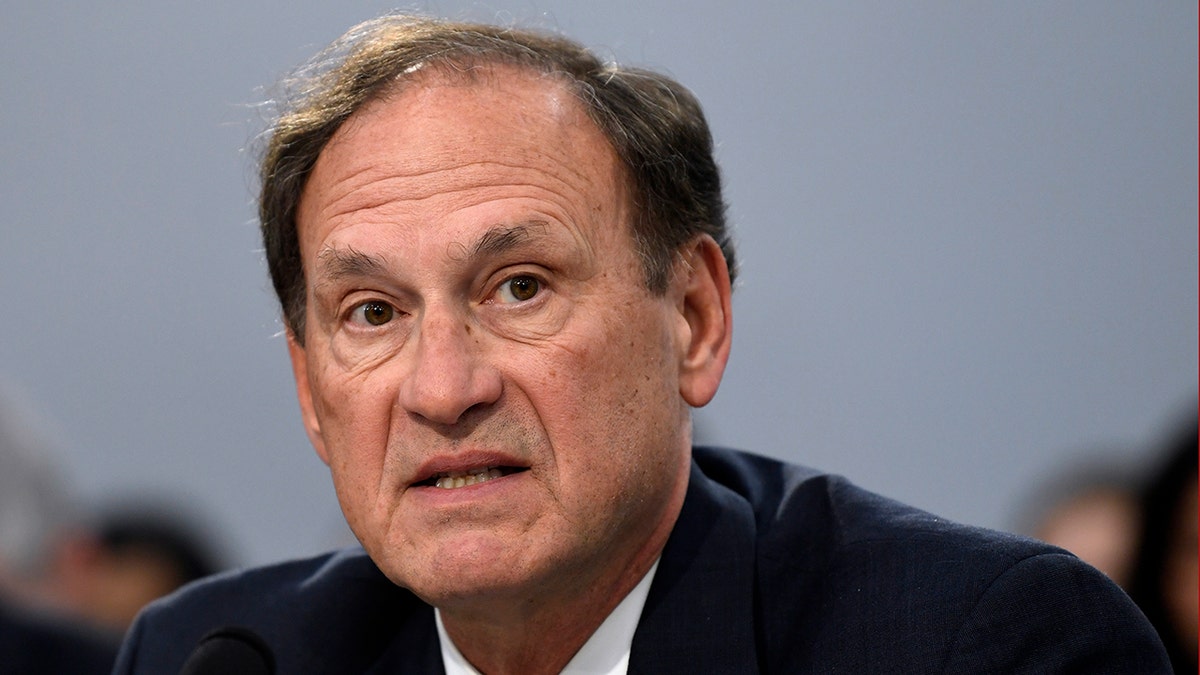Fox News Flash top headlines for Nov. 25
Fox News Flash top headlines for Nov. 25 are here. Check out what's clicking on Foxnews.com
Supreme Court Justice Samuel Alito issued a fiery defense of free speech Monday morning as the high court announced it would not hear an appeal from the conservative magazine National Review in a defamation case against it by liberal climate science professor Michael Mann.
Mann's case against the magazine stems from his creation of the infamous "hockey stick graph" and a central role in the "Climategate" scandal -- in which his employer, Penn State University, eventually cleared him of wrongdoing.
National Review published an op-ed that called his graph -- which displays earth's temperature increasing seemingly exponentially beginning right around the industrial revolution -- "deceptive" and "fraudulent" over its substitution of certain types of data for thermometer readings for time periods before thermometers were available. The magazine called for an investigation into Mann and doubled down on its stance in subsequent writings.
Monday's decision means Mann can continue his defamation suit against National Review, which argued that its articles criticizing his methodology were protected speech.
"If the speech in all these cases had been held to be unprotected, our Nation's system of self-government would not have been seriously threatened," Alito wrote after naming several recent cases in which the Supreme Court upheld controversial speech, including the trade name "F-U-C-T" for a clothing company. "But ... the protection of even speech as trivial as a naughty trademark for jeans can serve an important purpose: It can demonstrate that this Court is deadly serious about protecting freedom of speech."

FILE - In this March 7, 2019, file photo, Supreme Court Justice Samuel Alito testifies before House Appropriations Committee on Capitol Hill in Washington.With one sentence on June 20, 2019, Alito signaled his willingness to throw out the Supreme Court's 84-year-old record of support for the broad powers of federal agencies that reaches back to the New Deal. (AP Photo/Susan Walsh, File)
HARVARD-YALE CLIMATE CHANGE PROTEST AT FOOTBALL GAME SEES 42 CHARGED, OFFICIALS SAY
The petition the court denied was on a procedural issue in a lower court -- whether a jury could decide if a claim is "provably false" -- and National Review will have the chance to appeal the ruling if lower courts rule against it. In fact, the Supreme Court's denial of National Review's petition is just one more step in a case that's been in the courts since 2012. But Alito said protecting the First Amendment meant the Supreme Court should take up the case that it would normally let play out at lower levels before stepping in.
"[R]equiring a free speech claimant to undergo a trial after a ruling that may be constitutionally flawed is no small burden," he wrote. "A journalist who prevails after trial in a defamation case will still have been required to shoulder all the burdens of difficult litigation and may be faced with hefty attorney's fees. Those prospects may deter the uninhibited expression of views that would contribute to a healthy public debate."
It its petition to the high court, National Review argued its criticisms of the graph's "cherry-picking of data and apples-to-oranges comparisons," were valid, adding that since it was at the center of a larger controversy about climate change the op-ed fell squarely within protected speech and National Review could not be sued for defamation.
Mann, on the other hand, leaned on the argument that he -- and his graph -- had survived significant scrutiny following the leaked emails that led to the "Climategate" scandal.
CLICK HERE TO GET THE FOX NEWS APP
"Furthermore, the court's repeated findings that the allegations against Dr. Mann were capable of verification were unequivocal," his legal team's brief in the case said. "These allegations were not only 'capable of being proved true or false,' they were proven 'false by four separate investigations.'"
Alito, however, emphasized the importance of open debate for America's democratic process, especially about hot-button issues like climate change.
"If citizens cannot speak freely and without fear about the most important issues of the day, real self-government is not possible," he said. "To ensure that our democracy is preserved and is permitted to flourish, this Court must closely scrutinize any restrictions on statements that can be made on important public policy issues. Otherwise, such restrictions can easily be used to silence the expression of unpopular views."












































